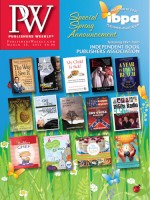Four graduate students from the Center for Publishing at New York University's School of Continuing and Professional Studies volunteered at the Abu Dhabi International Book Fair two weeks ago, thanks to generous support from literary agent Jane Dystel, who oversees the Oscar Dystel Research Fellowship Fund (set up by her father, the former chairman and president of Bantam Books). They helped with educational programming and events, working alongside representatives from KITAB, a joint venture between the Abu Dhabi Authority for Culture and Heritage and the Frankfurt Book Fair. Here are their impressions.
From our first step inside the massive conference hall, we knew we were not in your typical book fair catering to industry professionals. Open to the public, the event acts as a retail bazaar and forum for public education. Selling is a key function: the small number of bookstores in the region and the difficulty of transporting books across borders (censorship, piracy, and lack of credit are major obstacles) means that many publishers travel from one fair to the next with their boxes of wares.
We observed publishers from 58 countries dressed in formal suits trading rights from Arabic into other languages and vice versa. Meanwhile, school children holding hands, women dressed in traditional abayas, and men in kanduras browsed the stalls, eager to buy children's books and elaborate versions of the Qur'an and other religious tomes. (Adult trade books were less prevalent, though they were on display.) Our opinion was that this dual purpose—the fair as a retail marketplace and as industry trade show—meant there was just too much to accomplish. But until there is a way to distribute books in other ways in the Arab world (and online is growing through sites like neelwafurat.com), this is probably the best approach.
One of the greatest surprises of the fair for us was the emphasis on education and family. At "The Creativity Corner," children assembled for coloring projects and read-aloud sessions. "The Education Chapter" presented new teaching approaches for local educators. All in all, KITAB was doing a great job making the fair as inclusive and instructional as possible.
In our free time, we visited the famous Sheikh Zayed Grand Mosque, the largest in the United Arab Emirates, named after the founder of the modern UAE. We also stopped at the date market, and attended the Sheik Zayed Book Award ceremony at the Emirates Palace Hotel; the 45-minute event was mercifully shorter than U.S. equivalents. We also enjoyed dune bashing, camel riding, henna painting, and a traditional Arabic barbecue of lamb kebabs, with baklava. Thanks to the hospitality of NYU Abu Dhabi, we returned nightly to our comfortable, on-campus apartments.
Almost everywhere we went, we were surrounded by construction in almost every stage. In some places, scaffolds stretched for almost a mile. We found this expansion at a flying pace both exciting and overwhelming as we considered how Abu Dhabi seems to be on a continual building spree.
In fact, we observed that both Abu Dhabi and the Arab publishing industry were in states of construction, and that we were witnessing the development of an industry decades behind the U.S. For example, we met a representative from a fledgling Arab publishing group who has spent years trying to create a list of regional illustrators and writers to help them network and find work. We heard Arab publishers speak passionately about the importance of fostering Arab voices rather than relying solely on Arabic translations of works from other languages. We listened to local exhibitors wishing for better distribution systems. And just like those waiting for checks from Borders, there was a constant lament about the difficulty of getting paid (a typical payment schedule is four to six months).
A great deal of work is ahead for the Arab publishing community. It's a daunting task, but one full of exciting possibilities. We look forward to the prospect of a robust publishing industry some day and a way to construct new infrastructures and institutions, just like buildings going up in Abu Dhabi.
For more information about the Center for Publishing, visit scps.nyu.edu/areas-of-study/publishing.



 Volume 258
Issue 13
03/28/2011
Volume 258
Issue 13
03/28/2011





